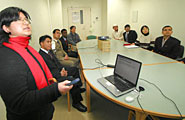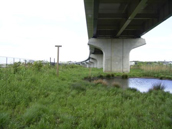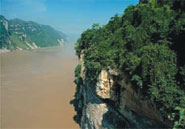Program in Environmental Science and Civil Engineering
It is becoming an urgent task to find solutions to global environmental problems that human civilization has brought about. The goal of the programs is to educate professional engineers who are fully aware of the problems arising from various spheres of the global environment and recognize them as tasks to be solved. The graduate students must thus be prepared, applying the tools offered by modern science, to analyze mechanisms of environmental problems and find concrete solutions. They also have to be able to establish the effective solutions as a system to improve sustainability so that nature and human society can continue to coexist. The programs are divided into two parts: the international program on civil and environmental engineering and the department of environmental science and technology. To allow graduate students to attain a high level of expertise in environmental systems, the curriculum in both departments is organized to meet a high international standard; most lectures are conducted in English and common lectures between two departments are held in several subjects.
International Program on Civil and Environmental Engineering

Seminar attended by foreign students from various countries.
Education and research, in the international course in civil and environmental engineering, have the goal of educating students to make creative contributions to planning, design, construction, maintenance and management techniques that are required to build infrastructures that sustain a harmonious relationship between human society and nature, while still answering the ever increasing diversity of societal needs. Students under this program can pursue one of the following fields: (1) environmental geotechnical engineering, which concerns with the prediction and alleviation of geological disasters, the prevention and clean-up of soil and groundwater pollution and, and the safety analysis for large scale underground caverns, (2) earthquake engineering, which deals with the physics and wave propagation of earthquakes, quake resistance, and the prediction and prevention of seismic hazards, (3) structure and material systems, which deals with the design of safe and functional structures, creation of humane and environmentally friendly structures, development of innovative materials and recycling technology, (4) environmental hydraulic engineering, which deals with ecologically friendly methods of irrigation, flood control and disaster prevention for rivers and in coastal areas, (5) regional planning and design, which includes amenity-oriented city planning, concepts for urban transportation and the preparation of infrastructure in developing countries. Although the basis of study and research in these fields remains anchored in the natural sciences, we aim at a comprehensive approach to engineering that also considers contributions from the fields of social sciences, humanities, political economy and the arts in the creation of societal infrastructures.
>> To International Program on Civil and Environmental Engineering
Course in Environmental Science and Technology

Metropolitan Expressway with which biotope of Japanese maximum scale is formed

The Yangtze River contaminated by severe water pollutants.
Environmental control systems takes a systems science approach to analyzing the relation between humanity and the biosphere with a view towards the aim of environmental preservation. The goal of education in the course is to foster individuals who can make a contribution towards alleviating the stress imposed on the environment by human activity and the establishment of a sustainable, recycling-oriented societal system. We welcome students from a variety of educational backgrounds who have an interest in the environment and hope to pass on to them high level expertise in a curriculum that cuts a systematic path through the diversity of themes in the environmental field and includes the necessary fundamental environmental science and application of its scientific methods in the investigation of environmental problems, the methods of comprehensive environmental assessment and management, the mutual interaction of humanity and the environment, the functioning of the natural ecosystem, techniques of measuring environmental changes using sensing technology, and recycling and environmental control technology for saving resources and energy. By deepening the understanding of the workings of the environment and of the essence of environmental issues and by heightening the awareness of the finiteness of the earth’s ecosystem, we hope to educate experts who can play a leadership role through their knowledge of the scientific and technical methods of environmental regulation and control that will contribute to successfully combining sustainable development and environmental conservation.